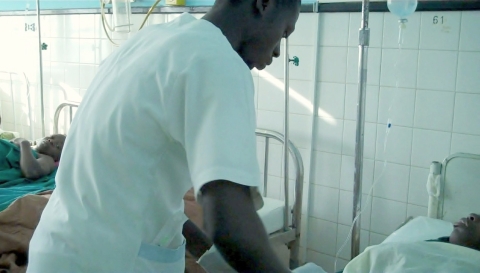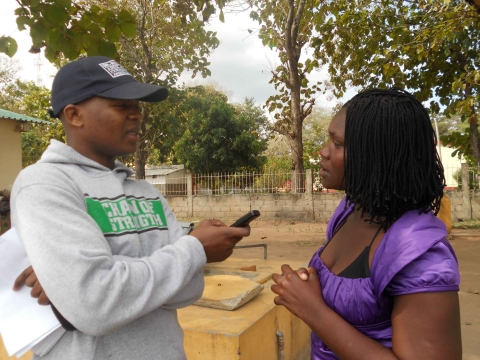
Mozambique's Parliament is likely to approve decriminalizing abortion later this year, a move that will impact procedures performed at sites like the gynecological ward at Beira Central Hospital. (Photo by Mercedes Sayagues)

A journalism trainee (left) interviews a community health activist with Pathfinder, an organization which promotes family planning and warns about unsafe abortions in Chokwe, Gaza province. (Photo by Mercedes Sayagues)
In my work as a Knight International Journalism Fellow charged with highlighting health issues in Mozambique, this was an ideal opportunity to profile a health problem that receives little attention.
In 2011, hospitals in Maputo province admitted 9,400 women with serious medical complications resulting from unsafe abortions. Of these, eight died. Hundreds, if not thousands, stayed for weeks and months in hospital, requiring blood transfusions, antibiotics and surgery.
At Mavalane hospital, located in a modest and populous neighborhood near Maputo’s airport, 3,400 women were treated for complications from clandestine abortions. That’s 40% of all the women admitted through the hospital’s Gynecological Emergencies Services. And here in the capital city, these cases are just the tip of the iceberg of a deadly national challenge.
In the rural areas, where 17 million of Mozambique’s 22 million people live, and where only seven percent of women use modern contraception, those with botched abortions have little chance of reaching an emergency ward. They will die without being counted as the collateral cost of the country’s controversial legislation on this issue.
This is about to change. In October, Mozambique’s parliament will discuss decriminalizing abortion and getting rid of laws from 1886 that mandate lengthy sentences for those who seek and those who offer abortion. Recognizing that the penal code from the 19th century is out of date, the law has not been applied in decades.
In fact, the main hospitals in the two largest cities – Beira and Nampula, as well as the capital of Maputo – provide safe abortion services with few questions asked. But rural and peri-urban women do not have access to these services.
To promote coverage of abortion-related issues during this year, the network of NGOs for Sexual and Reproductive Rights and Health (DSR) set up prizes of US$1,000 and US$500 for the best stories, and a small fund to cover logistical costs of reporting. The DSR asked me to manage the technical aspects of this project.
We started with a press briefing on Tuesday, June 26th. A sociologist, a medical doctor, a lawyer and an activist spoke about different aspects of abortion. A group of journalists who report on health and gender issues attended. We provided a folder with fast facts, a list of sources and background information.
The first result was two features, taking up three-quarters of a page in Noticias, the government-owned daily broadsheet newspaper, based on the briefing. TVM, the national TV station, showed up at the briefing, interviewed the speaker, Dr. Ivonne Zilhao, and featured the news item prominently in the noon and evening newscasts. One of my former trainees, a young reporter named Salane Muchanga, wrote almost a full-page story summarizing the facts of abortion in Mozambique. It ran in Noticias, where she works as a full-time reporter now; it is quite an accomplishment for a newspaper to devote that much space to a neglected health problem.
DSR circulated the news about the prize and the grants. Radio journalists doing programs in African languages are encouraged to apply for the grants, which will pay for costs incurred in covering selected stories – such as travel, phone and Internet. The deadline to submit stories for the competition is at the end of September, and winners will be announced in October. Already we are receiving queries from media, many from the provinces, and from former trainees who attended my workshops on obstetric fistula and other reproductive health issues. We hope to give unsafe abortion visibility in order to save women’s lives.